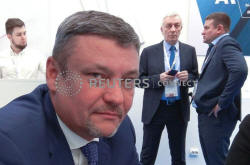|
Last autumn, Rusal, the world's largest aluminum producer
outside China, missed the traditional window for contracting
sales for this year as it was still negotiating with the U.S.
Treasury Department to be removed from a sanctions list.
"We fulfilled all our obligations even during the period of
sanctions, we did not allow ourselves a single failure.
Therefore, some of our former partners are already coming back,
new partners are coming," CEO Evgenii Nikitin said.
"We hope that we will be able to bring back our clients toward
September, the contracting period for 2020," he added in an
interview with Reuters.
Rusal's nine months of talks with Washington ended successfully
in late 2018. In January, Washington excluded Rusal from the
sanctions list but kept founder Oleg Deripaska, who had to give
up his control of the firm as part of the deal.
During sanctions, Rusal lost some of its customers, including
Novelis Corp, the world's biggest producer of rolled aluminum
products.
The company is partially resuming deliveries to them but admits
that it will have a chance to regain all its clients only when
contracts for 2020 are signed.
"We expect to restore lost positions in all the traditional
markets for the company, including Asia and America, with which
difficulties arose last year. To date, we have already resumed
deliveries to the American market," Nikitin said.
"Volumes for 2019 for most customers, including Novelis, are
already contracted, but if there is a need for an increase, our
partners will contact us. The same applies to customers in
Japan."
Asked if a new contract with Glencore was coming after the
expiry of their long-term contract in late 2018, Nikitin said: "Glencore
is one of our big customers. We are in negotiating positions
with all clients."
NEW SMELTERS
Rusal planned to keep its 2019 production and investments stable
at 3.8 million tonnes and $900 million, respectively, Nikitin
said.
Last week, the company launched new production at its Boguchansk
aluminum smelter in Siberia, doubling its annual capacity to
298,000 tonnes a year. The company is currently considering a
further increase in Boguchansk's capacity, Nikitin said.
Rusal is also constructing the Taishet aluminum smelter, which
it expects to launch in late 2020 and is discussing attracting
financing for it from Russian and foreign banks.
Rusal is confident both Taishet and Boguchansk will find demand
for their product. It expects global demand for aluminum to grow
by 3.7 percent to 68 million tonnes in 2019 and maintain the
same pace of growth in 2020.
Nikitin also said that there were no issues with Russia's
alumina supplies from the Mykolaiv (Nikolayev) plant in Ukraine.
He, however, said he did not know whether negotiations to sell
the plant to Glencore, which were halted due to U.S. sanctions,
would resume.
Rusal also plans to keep its 20 percent stake in Australia's QAL
and is in talks with Kazakh firm ERG on a new alumina supply
contract, Nikitin said, adding that in general, Rusal does not
consider selling any of its assets in the near future.
Nikitin has been with Rusal for more than 25 years and was
offered the CEO job in May by the board, a month after the U.S.
sanctions against Rusal.
(Reporting by Anastasia Lyrchikova; writing by Polina Devitt;
editing by Tom Balmforth and Emelia Sithole-Matarise)
[© 2019 Thomson Reuters. All rights
reserved.] Copyright 2019 Reuters. All rights reserved. This material may not be published,
broadcast, rewritten or redistributed.
Thompson Reuters is solely responsible for this content.

|
|





